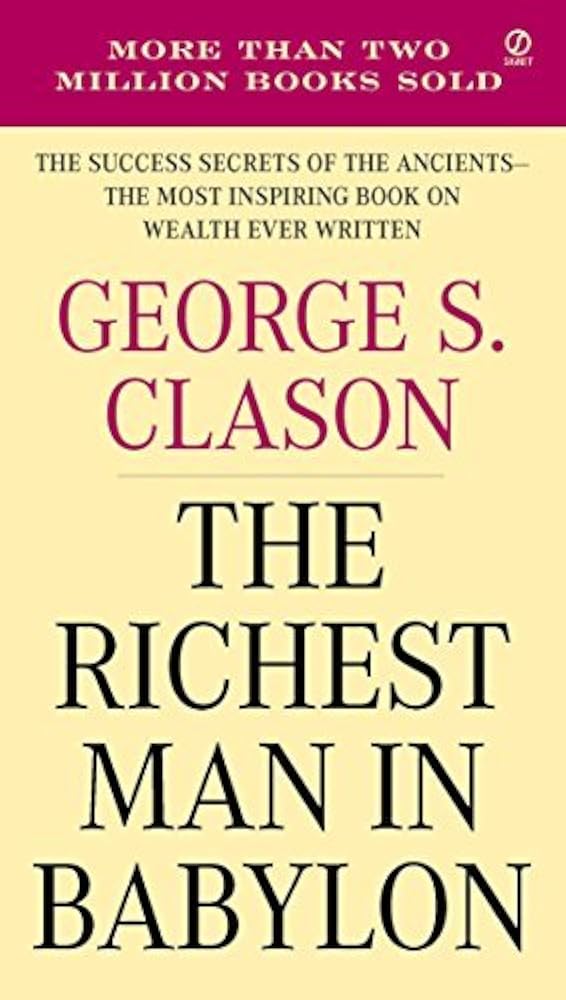Introduction
Have you ever read a book but were too immature to grasp its wisdom, only to rediscover it decades later and realize the path to wealth was there all along—collecting dust? For me, The Richest Man in Babylon is that book. I first picked it up 20 years ago when someone told me it held the secrets to wealth, but at the time, the ancient Babylonian parables about “thou” and “thy” went over my head. Today, I understand why this 1926 classic remains a cornerstone of personal finance. Here are 10 transformative lessons from George S. Clason’s masterpiece.
Why This Book Matters
Written as a series of parables set in ancient Babylon, Clason’s book distills financial wisdom into principles so universal they remain relevant nearly a century later. Unlike modern finance books filled with complex jargon, its strength lies in simplicity: stories about gold, slaves, and merchants that teach us about saving, investing, and wealth-building.
1. Seek Wealth Unapologetically
Many never achieve wealth because they never truly seek it. The book’s protagonist, Arkad (the richest man in Babylon), is blunt about his ambition:
“In my youth I looked about me and saw that wealth increases the potency of all things. With wealth, one may ornament their home, sail distant seas, and feast on the delicacies of far lands.”
While we shouldn’t obsess over money, we must recognize its power to fulfill our desires and navigate life’s complexities. Wealth won’t magically appear—it requires active pursuit.
2. Pay Yourself First (The 10% Rule)
Arkad’s foundational lesson: “A part of all you earn is yours to keep.” Before paying bills or indulging expenses, set aside at least 10% of your income. The book’s analogy is striking:
“Fool! You pay everyone but yourself. As well be a slave working for what your master gives you.”
Imagine your $1,000 rent means you work 20 hours weekly just for your landlord. This mindset shift makes saving easier. Action step: Automate a 10% transfer to savings immediately when your paycheck arrives.
3. Invest In Yourself Relentlessly
“The more wisdom we know, the more we may earn,” says Arkad. Warren Buffett spends 80% of his day reading. Elon Musk taught himself rocket science through books. As Arkad discovered early in his career as a scribe, improving his writing speed directly increased his earnings.
Key insight: Self-improvement compounds. Whether through books, courses, or mentors, investing in your skills pays the highest dividends.
4. Take Action (Luck Favors the Doers)
Success is often dismissed as “luck,” but Clason argues luck favors those who act consistently. A procrastinator and a doer face the same opportunities, but the doer’s higher attempt rate statistically increases their success.
When young Arkad wanted wealth secrets from a merchant, he didn’t just ask—he negotiated a deal to carve clay tablets overnight despite exhaustion. The wealthy share one trait: they act while others overthink.
5. Wealth Depends on Expenses, Not Income
Clason reveals a brutal truth: “Necessary expenses grow to match income unless protested.” High earners with empty bank accounts prove this—lifestyle inflation devours raises.
“Confuse not thy necessary expenses with thy desires.”
The equation is non-negotiable: Income − Expenses = Savings. Whether you’re Floyd Mayweather or a barista, spending less than you earn is the only path to wealth.
6. Make Money Work For You (The Power of Passive Income)
“Gold slips away from the idle owner,” warns Arkad. Saved money should breed more money. The book’s analogy of money “slaves” working while you sleep mirrors modern passive income (dividends, rentals, royalties):
“Your money works while you sleep. It’s modern-day slavery, and it’s 100% legal.”
Example: Saving $10,000/year for 30 years yields $300,000. Invested at 8% annually? Over $1.1 million. Compounding turns savings into wealth.
7. Avoid Risky Investments (The Brickmaker’s Lesson)
Arkad lost his first savings investing with a brickmaker in rare jewels—a field neither understood. Similarly, his son squandered inheritance betting on horses. The lesson: Never invest in what you don’t understand.
Modern parallels: FOMO-driven crypto purchases or get-rich-quick schemes. As Arkad warns: “Gold clings to the cautious owner.”
8. Build Your Financial Walls (Protection First)
The book tells of Babylon’s walls repelling invaders despite being outnumbered. Similarly, your wealth needs protection:
- Emergency funds (6-12 months’ expenses)
- Insurance (health, life, property)
- Diversified investments
As Babylon’s defenders knew: “Preparation turns crisis into inconvenience.”
9. Seek Wise Counsel (Not Opinions)
“Counsel with wise men,” advises Arkad. Most seek money advice from friends or family—often the least qualified. The brickmaker’s failed venture proves: Bad advice costs more than no advice.
Action step: Consult experts (financial advisors, successful investors) and verify their track records before acting.
10. Remember Why You Build Wealth (Enjoy Life)
Despite its focus on money, the book concludes: Wealth is a means, not an end. Arkad reminds us:
“Life is rich with things worthwhile to enjoy. Save diligently, invest wisely, but live fully.”
Balance is key—don’t sacrifice relationships or health for gold.
Final Verdict: A Must-Read for Financial Freedom
The Richest Man in Babylon earns its status as a classic. Its lessons—pay yourself first, control spending, invest in yourself, and let money work for you—are simple but transformative. While the language feels archaic, the principles underpin modern finance. For anyone seeking wealth, this book is foundational.
Key Strengths:
- Timeless principles explained through engaging stories
- Emphasis on behavior over complex strategies
- Short, digestible chapters (144 pages)
Who Should Read It?
Perfect for beginners overwhelmed by modern finance books, or experienced investors needing a behavioral reset.
About the Book:
- Title: The Richest Man in Babylon
- Author: George S. Clason
- First Published: 1926
- Pages: 144 (Paperback)
- Key Themes: Saving, investing, financial discipline, passive income
Ready to Implement These Lessons?
Start today with the easiest step: Pay yourself first. Set up an automatic transfer of 10% from your next paycheck into a separate savings or investment account. Your future self will thank you.
